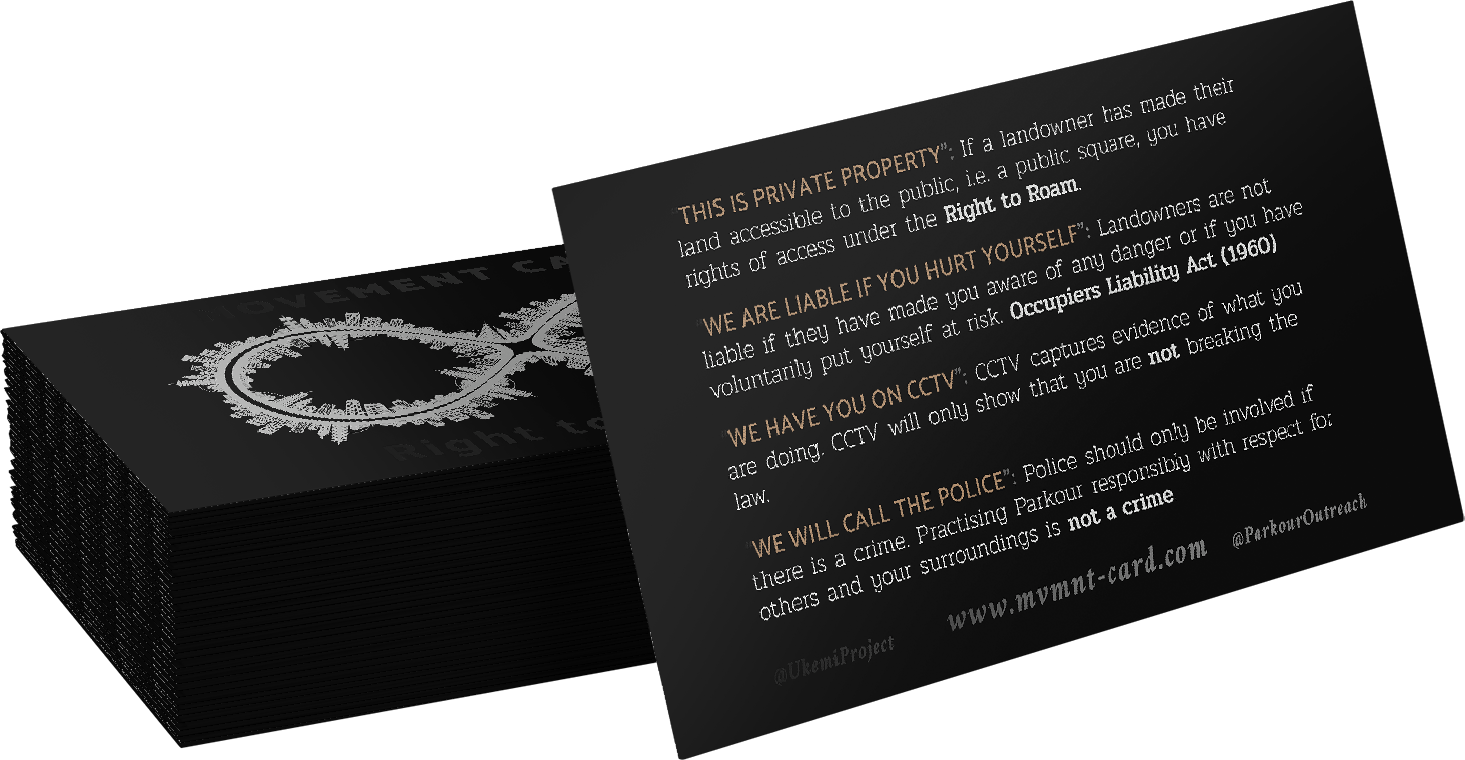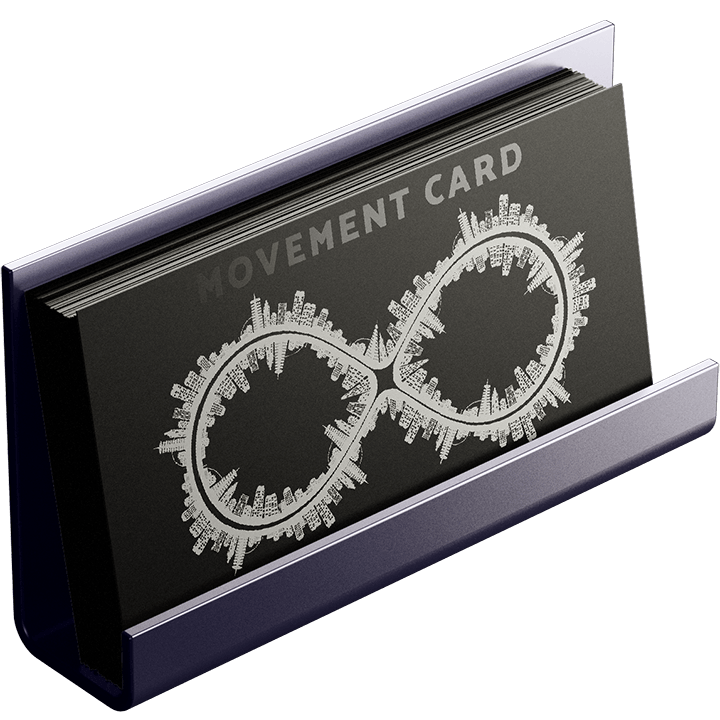Movement Card
Use the buttons below to read your rights or see how you can get involved in the project.
Read your rights! Get involvedThe card
Movement Card aims to educate and inform all who have interactions with people moving in the public domain. Whether that's you, your friends, the security guard, or even a police officer. With a Movement Card you have an instant educational resource at your disposal.

Your freedom to move should equal your freedom to speak!
Clean, Simple & Elegant
The movement card is part resource, part research and part response action created to promote freedom of movement. It is a worldwide project started in Scotland through a collaboration between Ukemi Project and Parkour Outreach.
Our goal is to have an option for as many locations as possible and we would love to hear from you if you have the knowledge or means to contribute!


Who's behind the project?
A collaboration between Ukemi and Parkour Outreach. We have now partnered with Parkour Earth too!
Ukemi promote activity in highly urbanised areas and encourage a healthier society through digital design, product creation, and community arts development.
Parkour Outreach is a community interest company seeking to encourage physical activity, health and well-being by exploring funding opportunities, collaborations, and supporting new and potential Parkour communities.
Parkour Earth is the International Federation for Parkour/Freerunning/Art du Déplacement. As such, it will be the custodian of the philosophy, integrity, and sovereignty of the sport internationally for and on behalf of the community.
Right to the city
The following will guide you through the legal rights relating to
the typical reasons given by security guards/landowners.
Always train with respect for others and your surroundings. Do not
run away or act suspiciously if police or others approach you. If
you are asked to move on, then you should explain what Parkour is,
be respectful and move on. It is better to be on good terms with
landowners and/or the police if you, or other practitioners, want to
return another day.
"This is private property"
If the land is owned by someone, it is private property. Confusingly, this includes land that is publicly accessible. This means that almost all land in Scotland will be private property, but this does not always mean you cannot be there.
If a landowner has made their land accessible to the public, i.e. a public square, you have rights of access under the Land Reform (Scotland) Act 2003 as long as you are behaving responsibly. This is commonly referred to as the Right to Roam.
You are not breaking the law by training on private land that is open to the public, so you should not be treated as if you are breaking the law. Landowners should be reminded of this if they move you on for this reason.
It is worth noting that the Right to Roam does not apply in certain areas, for example, land that is close to or within a building; school grounds; and construction/demolition sites.
"We are liable if you hurt yourself"
Under the Occupiers’ Liability (Scotland) Act 1960, occupiers of property owe a duty of care to take care of people entering their land or premises as is reasonable in all of the circumstances.
An occupier, for these purposes, is someone occupying or having control of land or other premises - this would include Landowners and their security guards. Landowners are generally worried about being liable if you hurt yourself whilst practising Parkour on their land.
However, liability would only arise if an injury occurs in one of the following situations
- An injury occurs as result of dangers that are due to the state of the premises, e.g. slippery or uneven floors; or
- An injury occurs as a result of anything done or omitted to be done by the occupier that has created a danger on the premises, i.e. they have not warned you about something dangerous on their premises.
Even if you tried to sue the landowner, they would be able to plead the defence of volenti non fit injuria - this means that you voluntarily accepted the risk of being injured. The landowner would not be liable if you voluntarily accept a risk that is inherent in Parkour.
As such, landowners are not liable if they have made you aware of any danger on the premises or if you have voluntarily put yourself at risk. Landowners should therefore be reminded that they would not be liable if you hurt yourself when voluntarily training Parkour on their land.
"We have you on CCTV"
If this reason is being given to you, the landowner is assuming that you are doing something unlawful. You should let them know that you are not doing anything unlawful and that you are happy to captured on CCTV.
CCTV is merely capturing evidence of what you are doing and is definitely not a reason for you to move on. If you are training with respect, then the CCTV will only show that you are not breaking the law. It is likely that they will then give you one of the reasons that we have set out above, i.e. private property and/or occupiers’ liability.
"We will call the Police"
If the landowner threatens to call the police, the landowner is assuming that you are doing something unlawful. The police should only be involved if there is a crime. Practising Parkour responsibly with respect for others and your surroundings is not a crime. As such, even if the police were called to the premises, it is unlikely that they would require you to move.
However, if the police request that you move on, you should explain what you are doing and then move on upon their request.
The information here is for educational purposes only and does not constitute legal advice.
Help us cover your country!
Every country needs a champion to step forward to make this happen. We will supply the design as well as provide guidance on how to build your team and get the information you need. If this is you then get in contact by emailing us or with a DM on social media.
